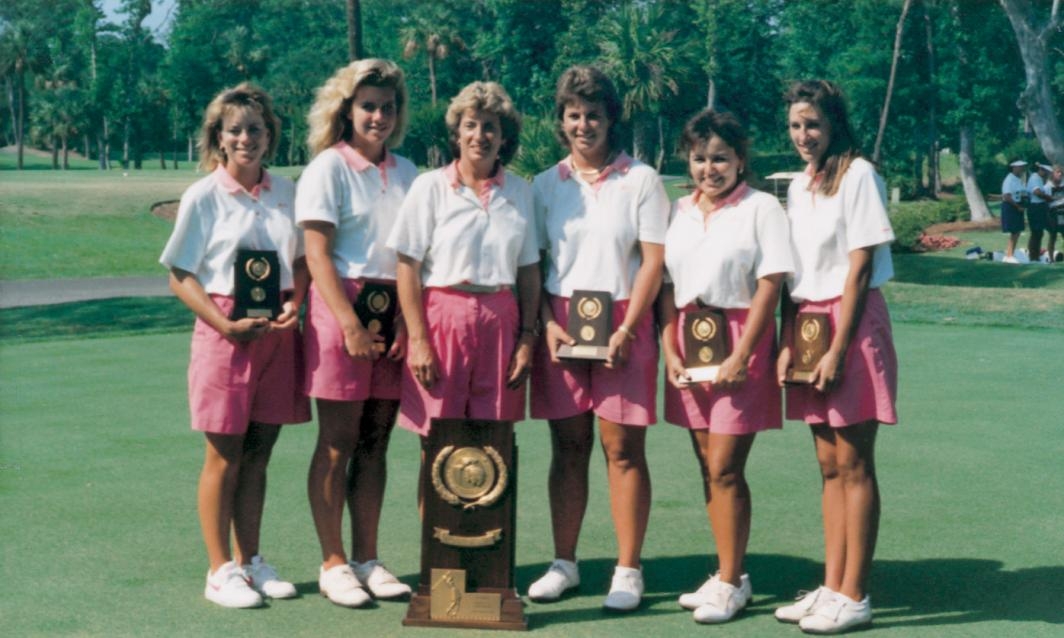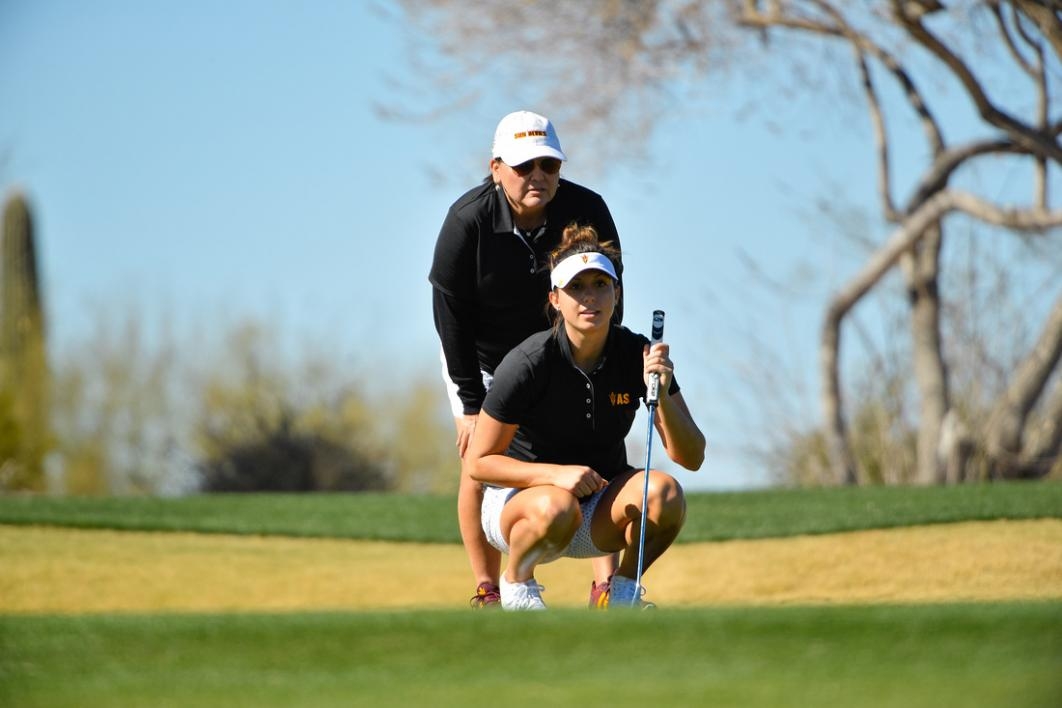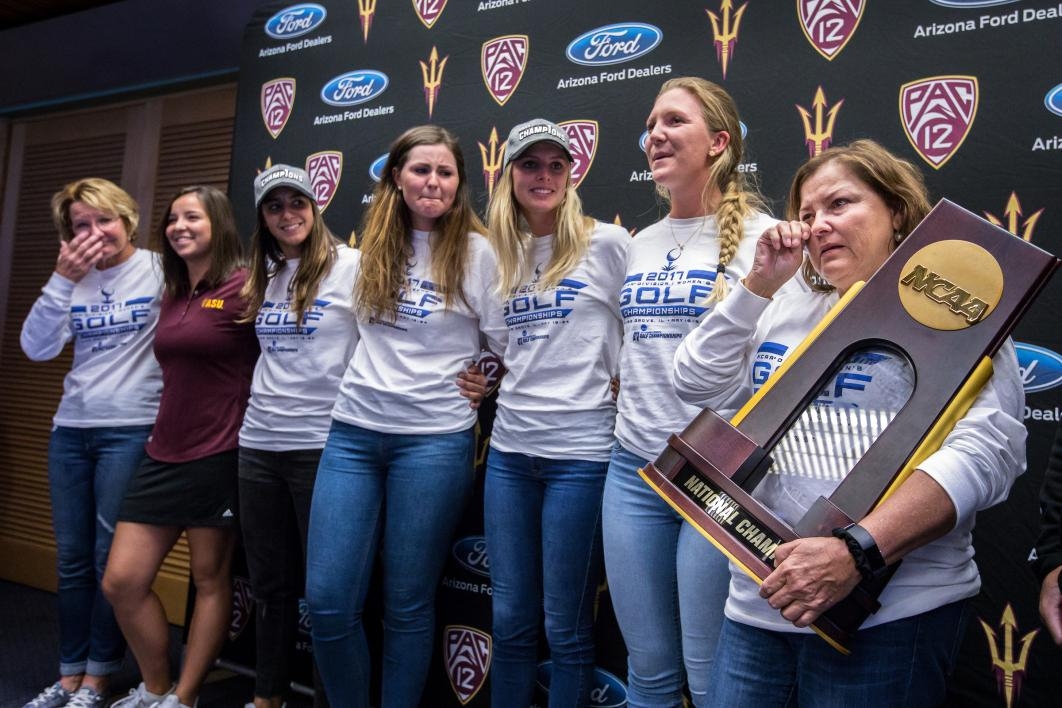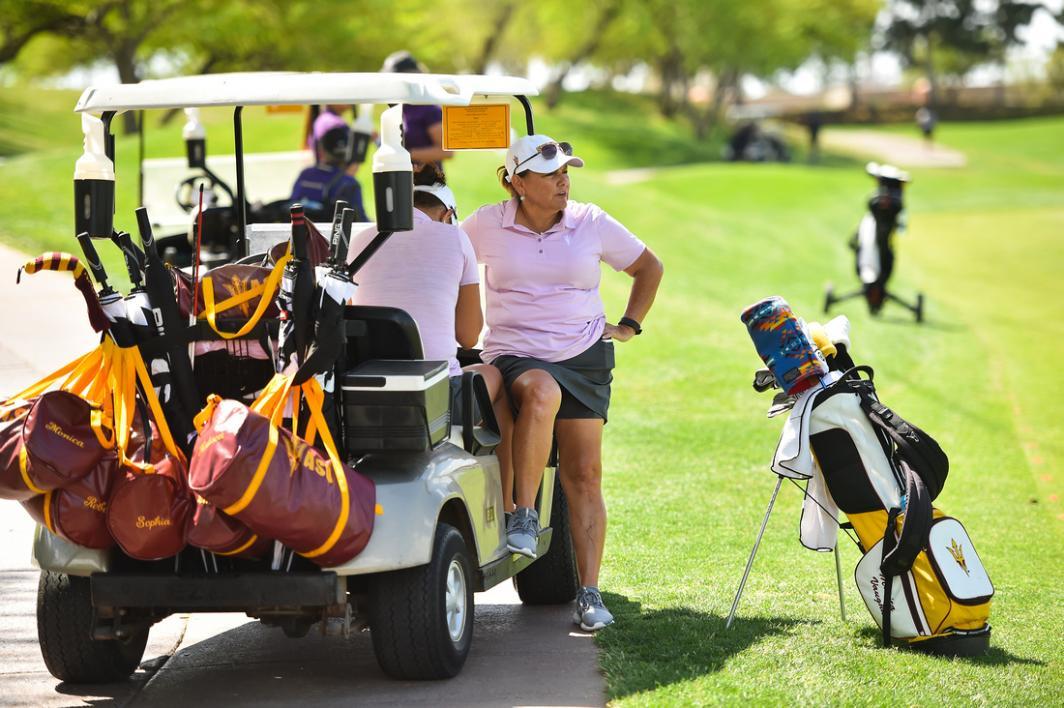The Sun Devils women’s golf team had a lot of ups and downs this season, according to Head Coach Missy Farr-Kaye. But they ended the year at the very top: Arizona State University won the national championship for the eighth time in the program’s history — the most of any NCAA Division I program.
It was Farr-Kaye’s third NCAA title. She won the first while a senior on the ASU golf team, in 1990. Her second was as an assistant coach of the Sun Devils, in 2009. She took the program to the national championship in Illinois in May in only her second year as head coach, and she has won a plethora of accoladesFarr-Kaye was named the Golfweek Division I Women's National Coach of the Year, National Coach of the Year by the Women's Golf Coaches Association, West Regional Coach of the Year and Pac-12 Coach of the Year..
The golf season runs from September to May, and Farr-Kaye started the season last fall without an assistant coach, which, she said, was a blessing in disguise.
“It worked out well to have a couple of months by myself because I really had a chance to connect with my players. When you’re the only resource, they come to you for everything,” she said. In November, Michelle Estill, a former professional golfer and a teammate of Farr-Kaye’s at ASU in the 1980s, was hired as the assistant coach.
Besides the team victory, Sun Devil Monica VaughnVaughn was named winner of the Honda Award, the Pac-12 Tom Hansen Medal of Honor and the Pac-12 Women's Golfer of the Year. won the NCAA individual title, two weeks after graduating with a degree in communications.
Vaughn said the key to Farr-Kaye’s coaching success is that she’s more than coach.
“She’s a mom away from home, and she’s a mentor. She’s a doctor when she needs to be,” she said.
“That’s helped to create such a great bond. She lets us know that she cares more how we are as people than how we are as golfers.”
Farr-Kaye talked to ASU Now about how she worked throughout the season to lead the team to the pinnacle of success.
1. She found inspiration in different places.
“I realized the most important thing we needed to do was to be a team that was mentally strong and gritty.
“I love to watch what the good coaches are doing, and I spend a lot of time reading. I watched a TED Talk on grit by Angela Duckworth, who also wrote a book about it [‘Grit: The Power of Passion and Perseverance’] that’s on my nightstand and that I keep highlighting.
“I started following Jon Gordon, who mentors many coaches and wrote ‘The Power of Positive Leadership.’ ”
2. She asked for a commitment to the very end.
“In January, we had a team retreat. We brainstormed how we wanted the entire season to look up until the last day. We had to be all in until May 24, the last day of the finals.
“It’s easy to get a little burnt out at the end of the season. They miss their families. We had Monica as a senior, with the pressure of graduating and ‘what will I do next?’
“I wanted them to commit to each other, and all of us to commit to each other, until we were done.”
3. She personalized her coaching.
“It’s really important to know the individual players. What I say to one player is not going to resonate with the next one.
“You have to have those relationships where you know who needs a tougher love — ‘Come on. What are you doing?’ And that the other needs to hear, ‘You’re fine. It’s all right.’
“It takes a lot of time and intuition to learn what makes each of them tick.”
4. She built up the players' mental toughness.
“We struggled at conference. We had a bad first day in our minds, and the girls were devastated. I told them we had a fantastic year. We won our home tournament for the first time in 10 years. We’re not going to let one bad day ruin it. Let’s take apart what we need to. Let’s be smart about his. [The team won the PING/ASU Invitational by 20 strokes in April but finished in sixth place in the PAC-12 Women’s Golf Championship in Tucson later that month.]
“I think it worked well for us that we played poorly at conference because it helped us reset. They dug a little deeper, practiced a little harder and showed what they were made of.
“I pulled an article out of the Arizona Republic, ‘Mental toughness cannot be underrated.’ We had a meeting about it. I said, ‘Bring your highlighters’ and we talked about it.
“These are qualities that are really important that will hold you through difficult times.”
5. She balanced the work with play.
“That was something I really focused on at the end of the year. I wanted them to have fun on the journey.
“And we did. We had team songs. There are Snapchats of me dancing. That’s not something they always see in me.
“We were about to walk to the tee to play for the national championship and I put my music on and made Robbie Liti dance with me. That was good for her to get her relaxed.
“Our song was by Shawn Mendes, ‘No Holding Back.’ We played it in the cars, and they nicknamed the trophy Shawn.”
Video by Ken Fagan/ASU
Top photo: Missy Farr-Kaye, head coach of the Sun Devils women's golf team, won her third NCAA title in May. Her first was as an ASU player, in 1990, and the second was as assistant coach, in 2009. Photo by Charlie Leight/ASU Now
More Science and technology

Podcast explores the future in a rapidly evolving world
What will it mean to be human in the future? Who owns data and who owns us? Can machines think?These are some of the questions pondered on a newly launched podcast titled “Modem Futura.” Co-…

New NIH-funded program will train ASU students for the future of AI-powered medicine
The medical sector is increasingly exploring the use of artificial intelligence, or AI, to make health care more affordable and to improve patient outcomes, but new programs are needed to train…

Cosmic clues: Metal-poor regions unveil potential method for galaxy growth
For decades, astronomers have analyzed data from space and ground telescopes to learn more about galaxies in the universe. Understanding how galaxies behave in metal-poor regions could play a crucial…




